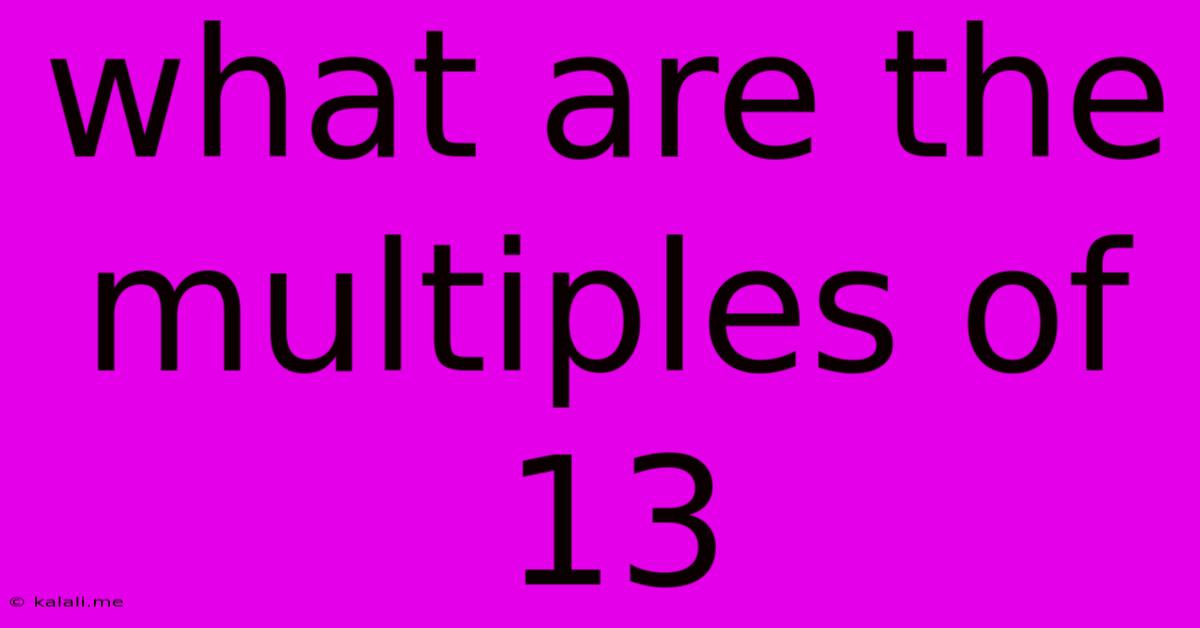What Are The Multiples Of 13
Kalali
Jun 14, 2025 · 3 min read

Table of Contents
What Are the Multiples of 13? A Comprehensive Guide
This article explores the concept of multiples of 13, providing a clear understanding of what they are, how to identify them, and their significance in mathematics. Understanding multiples is fundamental in various mathematical applications, from basic arithmetic to more advanced concepts like algebra and number theory. This guide will provide you with the tools to confidently work with multiples of 13 and beyond.
Defining Multiples
A multiple of a number is the result of multiplying that number by any whole number (0, 1, 2, 3, and so on). Therefore, multiples are essentially the products of a given number and any integer. For instance, the multiples of 5 are 0, 5, 10, 15, 20, and so on. These numbers are all obtained by multiplying 5 by 0, 1, 2, 3, 4, and so forth.
Identifying Multiples of 13
To find the multiples of 13, we simply multiply 13 by successive whole numbers. The first few multiples of 13 are:
- 13 x 0 = 0
- 13 x 1 = 13
- 13 x 2 = 26
- 13 x 3 = 39
- 13 x 4 = 52
- 13 x 5 = 65
- 13 x 6 = 78
- 13 x 7 = 91
- 13 x 8 = 104
- 13 x 9 = 117
- 13 x 10 = 130
And so on, continuing infinitely in both the positive and negative directions (including negative multiples). There's no limit to the number of multiples a given number possesses.
Practical Applications of Multiples of 13
While it might seem like a niche topic, understanding multiples has broad applications. Here are a few examples:
- Multiplication Tables: Learning multiples is fundamental to mastering multiplication tables. Understanding the multiples of 13 helps build a stronger foundation in arithmetic.
- Division: Knowing multiples assists in division problems. For example, recognizing that 104 is a multiple of 13 helps quickly solve 104 divided by 13.
- Number Theory: Multiples play a crucial role in number theory concepts such as divisibility, prime factorization, and least common multiples (LCM).
- Real-World Scenarios: Multiples can be applied to practical situations like equally distributing items or calculating quantities. For instance, if you need to arrange 130 chairs in equal rows, understanding the multiples of 13 helps determine possible arrangements.
Beyond the Basics: Identifying Non-Multiples
Just as important as identifying multiples is knowing how to determine if a number isn't a multiple of 13. The simplest way is to attempt division. If a number divides evenly by 13, with no remainder, it is a multiple. If there is a remainder, it is not a multiple. You can also use divisibility rules (though there isn't a simple rule for 13 like there is for 2 or 5), but division remains the most straightforward method.
Understanding multiples is a building block in mathematics. Mastering the concept of multiples, including those of 13, strengthens your mathematical abilities and opens doors to more complex mathematical explorations. By practicing and applying this knowledge, you'll gain a more robust understanding of numerical relationships.
Latest Posts
Latest Posts
-
Least Common Multiple Of 4 8 And 12
Jun 15, 2025
-
Difference Between A Square And Rhombus
Jun 15, 2025
-
Unit Weight Of Water In Kg M3
Jun 15, 2025
-
How To Balance Chemical Equations Calculator
Jun 15, 2025
-
Which Of The Following Describes Transpiration
Jun 15, 2025
Related Post
Thank you for visiting our website which covers about What Are The Multiples Of 13 . We hope the information provided has been useful to you. Feel free to contact us if you have any questions or need further assistance. See you next time and don't miss to bookmark.